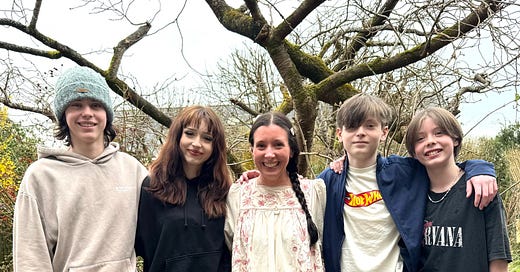We need to create a world that is designed for all neurotypes
Emily Quinton writes about raising four neurodivergent children who have needed different educational settings and a home-life that might look different to other people's but works for them.
There was always something a little different about my children, something quite magical but also something quite unpredictable.
Before having children I’d spent a lot of time with young children, so I thought I knew what to expect when I started having my own.
In many ways, I did - and I expect the way that I felt so absolutely comfortable in and in love with motherhood right from the beginning really helped my sensitive, magical children feel more relaxed and secure than they might have done in another setting.
I have four children, all two years apart, all neurodivergent.
The pre-school years, although chaotic and messy and full of little people, were the years where I could listen to my intuition and parent them in the ways I just knew they needed.
It is only looking back all these years later, knowing what I know now, that I really understand what was going on and really, deeply appreciate how much I have always listened to my intuition.
But then came the school years and life just began to get more complicated.
For many years I tried to get my head around what was going on for all of them. All so different and yet with a common thread of deep sensitivity, a homing instinct so very strong and a need for regularly being just us.
Our London primary school looked after our children really well but they would not enter into any discussion about the possibility of autism.
“He just needs to mature.”
“She’s just really shy and needs to talk more in class.”
But when my second child was in year 5 (aged 10) we couldn’t ignore things any more.
Secondary school was looming and as our eldest was already there, we knew that without support our son wasn’t going to manage life in a bigger school very easily.
So we embarked on a long journey of discovering that not just he but all of our children and my husband are all neurodivergent; all autistic and half with ADHD in the mix.
Now my children are 11, 13, 15 and 17 and they are all thriving thanks to a lot of talking, learning, experimenting and sharing.
We have made some changes in the way we do family life. For example we rarely all eat together, which often makes me sad but I think it’s only because I feel it’s what we are supposed to do.
Two of my children have misophonia, which means they find the sound of people eating really stressful. One of my children enjoys eating with me, so we do that as regularly as possible.
We also leave a lot of space for unscheduled time at home. Sometimes I find this hard because I want to go out and have fun as a family and worry we are missing out.
My sister’s family life is jam-packed with activities, so our family WhatsApp doesn’t help with these feelings. However, I know the huge benefits to my children in doing life this way.
As my children are getting older, they are getting really good at advocating for themselves. I have encouraged this at home because I have been very aware that once they leave home they will have to do a lot of this for themselves.
My elder daughter is now 17 and she has been really brilliant at asking her college for extra time in her exams and seeking out a series of counselling sessions when she was settling in.
She had two years out of the mainstream school system because school was just too stressful for her. She did one year of homeschool (mainly recovering from school burnout) and then one year at a small Steiner school on a farm.
Academically, she absolutely flourished in this setting and it really boosted her confidence in all areas of her life.
Navigating the school system is exhausting and some days I just want to pull them all out and just do home school but we take one term at a time and I keep on sending the emails and asking for the meetings.
And remembering that every time I secure some support for one of my children or help a teacher understand a bit more about neurodivergence, I have done this for all the parents and children coming behind us.
It is my hope that the more we share, the more we can support each other and the more people will understand that we need to create a world that is designed for all neurotypes.








Hi Emily I loved reading this. You are such a wonderful advocate.
Hope you are all keeping well x
This really resonated with me, we do family meal times in front of the TV because my eldest daughter has misophonia, so she wears loops and we have the TV loud enough for her to be ok with us eating. We all watch the next episode of something we all want to see. That's our bonding time. We also don't get out as a family very much, all needing down time (chronic illness also in the mix) but it works for us. We home educated, primary for both girls, then one chose to go for secondary, the other chose to stay home ed till Alevels. We're out the other side of childhood, oldest starting her master's degree and youngest looking at work options, onto the next adventures!